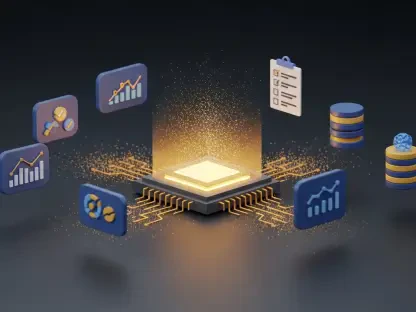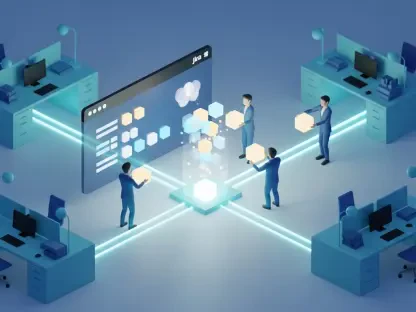As we conclude 2024, we can observe that the Salesforce DevOps landscape has experienced a monumental transformation driven by artificial intelligence (AI) and the advent of Virtual Employees (VEs). The past year has seen substantial innovations, emerging trends, and robust debates that have collectively redefined this technological sphere. Here is a comprehensive overview of the main themes, key points, and overarching trends that marked the pivotal year for the industry.
Emergence of Virtual Employees: A Silent Revolution
Infinite Scalability and Cognitive Commoditization
One of the most profound shifts of 2024 was the rise of Virtual Employees (VEs). These AI-powered entities have transcended the realms of simple automation tasks and are now proficient in performing high-value cognitive functions like qualifying sales leads, analyzing customer sentiment, and writing code. Companies can now achieve unparalleled efficiency, scaling operations effectively without a proportional rise in human resources. This seismic shift in operational capabilities owes much to the commoditization of cognitive labor. Tasks once reserved for junior analysts or entry-level specialists are now being executed on a grand scale by VEs, disrupting traditional career pathways in the process. VEs are not merely tools but have become indispensable assets in the tech world, offering immense promise in enhancing productivity and operational scalability.
However, while VEs bring about numerous opportunities, they also present significant challenges. The workforce hollowing effect caused by VEs is a cause for concern among industry experts. Entry-level and mid-tier positions, once regarded as essential steps for career growth, are steadily being eroded, creating an alarming gap in professional development opportunities. Ethical concerns are also mounting, with the potential for AI to increase inequality and economic disparity becoming ever more pronounced. Industry leaders and policymakers have called for measures to mitigate these disparities, urging a balanced integration of VEs that ensures the protection of human employment opportunities. The future challenge lies in effectively integrating VEs into the workforce while preserving the essence of human-driven roles.
Workforce Hollowing and Ethical Concerns
The rise of Virtual Employees has not been without its fair share of challenges. The erosion of entry-level and mid-tier positions due to the efficiency and capabilities of VEs poses a significant threat to essential career growth steps, creating what is often referred to as workforce hollowing. This phenomenon can lead to a lack of entry points for new entrants into the industry, potentially stalling career progression and hindering the development of necessary skills and experience. As VEs become more integrated into business processes, it is imperative to address these career pathway disruptions and find ways to balance the roles of human workers and AI.
Additionally, ethical concerns surrounding the widespread use of AI and VEs have been raised by numerous industry experts. The potential for increased inequality due to the displacement of certain job roles could exacerbate economic disparities, leading to a divided professional landscape where only a select few benefit from technological advancements. Advocating for measures to prevent these disparities, industry leaders have called for responsible AI deployment practices to ensure that the benefits of AI and VEs are equitably distributed. Developing frameworks and policies to safeguard human employment opportunities while leveraging the capabilities of VEs will be crucial in navigating this complex landscape. The goal is to foster an environment where both human and AI-driven contributions coexist harmoniously.
Salesforce: The AI Trailblazer
Agentforce: A Game-Changing Product
Salesforce solidified its position as a leader in AI-driven enterprise software innovation in 2024. The company launched several ambitious initiatives aimed at leveraging AI to transform how businesses operate. One of the most notable initiatives, Agentforce, significantly reshaped the CRM and enterprise software landscape. Agentforce is a comprehensive AI-powered platform designed to enhance various aspects of business operations, from customer relationship management to internal workflows. In the detailed analysis “VE Economics: The Force Behind Salesforce’s Agentforce Revolution,” Salesforce’s aggressive product roadmap was laid out, showcasing the transformative potential of Agentforce.
The Winter ’25 Release marked a turning point with the introduction of AI-driven test case generation, debugging, and natural language-to-code tools in their Alpha stages. These tools represent a paradigm shift in how development and operational tasks are approached, leveraging AI to increase efficiency and accuracy. By the Summer ’25 Release, these tools reached General Availability (GA), becoming fully integrated into development pipelines. This advancement underscored Salesforce’s commitment to driving enterprise-wide AI transformation. With Agentforce, Salesforce not only pushed the boundaries of what AI could achieve but also set a new standard for the industry, demonstrating the profound impact of AI on enterprise software solutions.
Ask Agentforce: A New Support Paradigm
Another significant development from Salesforce in 2024 was the introduction of Ask Agentforce, an AI-powered chatbot designed to revolutionize IT and customer support. This innovative solution highlights Salesforce’s focus on improving productivity and reducing user friction. Ask Agentforce leverages sophisticated AI algorithms to provide timely, accurate, and contextually relevant support, thereby enhancing user experiences and setting a new benchmark in support dynamics. By utilizing natural language processing and machine learning, Ask Agentforce can understand and respond to user queries with a level of precision and efficiency that human agents would find challenging to match.
This innovation represents a significant step toward rethinking traditional support paradigms. By automating routine support tasks and providing instant resolutions, Ask Agentforce allows human support agents to focus on more complex and high-value issues. This not only increases overall productivity but also improves user satisfaction by reducing response times and enhancing the quality of support. Salesforce’s introduction of Ask Agentforce is a testament to the company’s commitment to driving enterprise-wide AI transformation, fundamentally changing how businesses approach customer and IT support. Through Ask Agentforce, Salesforce has demonstrated the potential of AI to create more efficient, responsive, and user-friendly support environments.
AI and DevOps: A New Horizon of Innovation
AI-Augmented Pipelines and Scratch Org Snapshots
The integration of AI into the DevOps lifecycle was another dominant theme of 2024. Innovations in this area have redefined development processes and overall efficiency. Teams incorporating AI into their DevOps workflows reported a 30% increase in effectiveness, highlighting the significant impact of AI augmentation. One of the standout innovations was Scratch Org Snapshots, which provided pre-configured environments that dramatically reduced setup times by 1000%. This advancement enabled faster iterations for developers, allowing them to focus on building and refining their applications rather than spending time on initial setup.
The introduction of Scratch Org Snapshots has revolutionized how development teams approach project initialization and environment configuration. By providing ready-made environments tailored to specific project needs, developers can now bypass the often time-consuming and error-prone manual setup processes. This not only accelerates development timelines but also reduces the likelihood of configuration-related issues, leading to more stable and reliable development environments. The ability to quickly spin up and tear down development environments has given teams the flexibility to experiment, test, and iterate at an unprecedented pace, driving innovation and enhancing overall productivity.
Integrated Testing Tools and Quality Gates
Another major innovation in the DevOps landscape was the introduction of integrated testing tools and quality gates within DevOps Center. These tools automatically assess code before deployment, ensuring higher code quality and reducing the risk of errors. The introduction of quality gates has led to better management and operational growth, allowing teams to scale operations efficiently without compromising on flexibility. By automating the testing and validation processes, teams can focus more on development and innovation, confident that their code meets the required quality standards.
The integrated testing tools and quality gates have fundamentally changed the way development teams approach quality assurance. By embedding automated testing and validation steps within the development pipeline, these tools ensure that code undergoes rigorous scrutiny at every stage of the development process. This not only improves the overall quality of the code but also enhances the reliability and stability of the final product. The adoption of these innovative tools has enabled teams to deliver high-quality software at a faster pace, meeting the ever-increasing demands of the market. As a result, the integration of AI into the DevOps lifecycle has set a new standard for efficiency and quality in software development.
Rise of Platform Engineering
Abstracting Complexity and Providing Self-Service Capabilities
Platform engineering emerged as a complementary discipline to DevOps, abstracting complexity and providing self-service capabilities that allow teams to scale operations efficiently without compromising flexibility. This shift in approach has enabled better management and operational growth, as teams can now focus on innovation rather than spending time on infrastructure management. By creating robust, reusable platforms that encapsulate best practices, platform engineering allows development teams to leverage these foundational elements, streamlining their workflows and enhancing productivity.
The rise of platform engineering has also fostered a culture of collaboration and consistency within organizations. By providing standardized platforms and tools, teams can work more cohesively, reducing the friction that often arises from disparate systems and processes. This standardization not only improves overall efficiency but also enhances the quality and reliability of the systems being developed. As a result, platform engineering has become a vital component of modern development practices, enabling teams to innovate and scale more effectively while maintaining the flexibility needed to adapt to changing requirements and technologies.
Cognitive DevOps: The Advent of SRE.ai
One of the most remarkable developments in DevOps was the rise of Cognitive DevOps, spearheaded by SRE.ai. Cognitive DevOps integrates AI to create self-healing, adaptive systems, going beyond traditional DevOps approaches that heavily rely on manual intervention. SRE.ai tools monitor systems in real-time, predict failures, and take preemptive actions, significantly enhancing system reliability and availability. By leveraging machine learning and AI models, SRE.ai can analyze workload patterns, automatically adjusting infrastructure as needed to ensure optimal performance and cost efficiency.
Cognitive DevOps represents a significant evolution in the way we approach system reliability and operational efficiency. By incorporating AI-driven insights and automation, Cognitive DevOps solutions like SRE.ai can proactively address potential issues before they escalate into major problems. This proactive approach not only reduces downtime and improves system availability but also frees up valuable human resources to focus on higher-level tasks. The continuous learning capabilities of AI ensure that the systems are always improving, learning from past incidents to enhance future system reliability and performance.
Societal Impacts: Balancing Progress and Disruption
Economic Disruption and Calls to Action
Beyond technological advancements, 2024 was also a time for reflecting on the broader societal impacts of AI. Discussions around economic disruption, ethical considerations, and equitable AI adoption were prominent. AI’s commoditization of knowledge work poses risks of creating professional class divides, where only the elite benefit. As AI continues to transform industries, there is a growing concern that the economic benefits may not be equitably distributed, leading to increased inequality and social unrest. The potential for AI to exacerbate existing disparities and create new ones has led to calls for thoughtful and responsible AI deployment.
Advocacy groups, government intervention, and industry standards have been promoted to ensure responsible AI deployment and mitigate widening inequalities. Policymakers and industry leaders are urging the development of ethical frameworks and guidelines that prioritize fairness, transparency, and accountability in AI systems. By addressing these ethical concerns, we can ensure that the benefits of AI are accessible to all, fostering a more inclusive and equitable technological landscape. The challenge lies in balancing the rapid pace of AI innovation with the need for thoughtful and deliberate regulation that protects the interests of all stakeholders.
AI’s Broader Industry Influence
Anthropic’s Model Context Protocol (MCP) and AI in Science
As we wrap up 2024, it’s clear that the Salesforce DevOps landscape has undergone a dramatic transformation, primarily driven by the advent of artificial intelligence (AI) and Virtual Employees (VEs). This year has showcased substantial innovations, emerging trends, and intense debates that have collectively redrawn the boundaries of this technological field.
AI has become integral, enhancing automation and efficiency. Virtual Employees, or VEs, have played a pivotal role by managing tasks traditionally handled by human personnel, leading to increased productivity and cost savings. The integration of AI and VEs in Salesforce DevOps has spurred remarkable changes, pushing the industry toward new heights of sophistication.
One of the key trends in 2024 has been the rise of AI-powered analytics tools. These tools provide deeper insights, allowing teams to make data-driven decisions with greater precision. Additionally, continuous integration and continuous deployment (CI/CD) processes have been further refined, making software delivery more seamless and reliable.
Moreover, there has been a growing emphasis on security and compliance. As cyber threats become more sophisticated, Salesforce DevOps teams have prioritized implementing more robust security measures to protect sensitive data and ensure compliance with regulations.
In summary, 2024 has been a landmark year for Salesforce DevOps. The integration of AI and VEs, coupled with advancements in analytics, CI/CD processes, and security, has reshaped the industry, setting the stage for an exciting future.









